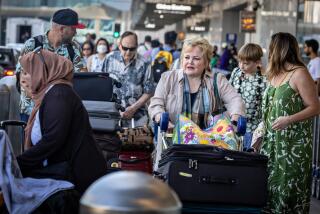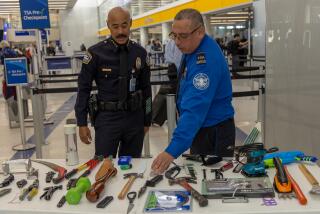Airport security measures prompt a wave of complaints
- Share via
The U.S. Travel Assn., the leading trade group for the nation’s $704-billion travel industry, has avoided endorsing or criticizing the augmented security measures adopted at U.S. airports in recent months.
But that may change soon, and the group’s position could influence the future of airport security.
The Washington-based group has largely been concerned about promoting travel to the U.S. to generate revenue for hotels, airlines, travel agents and other major players in the industry.
But in the last few weeks, the association received more than 1,000 unsolicited e-mails and phone calls from airline passengers, most of whom were unhappy with the heightened security tactics.
“It shows an immense interest in this subject,” said Geoff Freeman, executive vice president of the group.
For good reason. In the last month, the Transportation Security Administration has adopted a more aggressive pat-down search technique at airports nationwide and has expanded the use of full-body scanners that use low levels of radiation to create what resemble nude images of passengers.
To collect the comments of air travelers, the association launched a website last week, YourTravelVoice.org. Freeman said the comments collected on the site would be shared with the Obama administration, members of Congress and a blue-ribbon committee that the association created in February to draft recommendations to improve airport security.
“Travelers seem to be saying we can do better,” Freeman said.
The blue-ribbon panel — which includes Tom Ridge, former secretary of Homeland Security, and Robert Crandall, former president of American Airlines — is expected to release its recommendations Feb. 1.
• Business trips are back, with limits
By now, most business travelers know that the days of spending like a rock star while on business trips are long over.
Blame the recession. And don’t forget the folks at insurance giant American International Group, who drew nationwide scorn in 2008 for hosting a retreat at the luxurious St. Regis Monarch Beach in Dana Point after taking an $85-billion government bailout.
Business travelers are hitting the road again but not without strict spending limits, according to a new survey of 1,001 business travelers by the auditing and consulting firm Deloitte.
To cut costs, 33% of business travelers take shorter trips, 32% spend less on food and 21% spend less on hotel rooms, according to the survey.
Meanwhile, the most common guidelines being used by travel managers include spending limits on meals and hotel rooms, a requirement that employees book hotel rooms and airline tickets in advance and limits on when employees can fly in first class.
“People are starting to travel for business, but there is a lot more rigor in place,” said Adam Weissenberg, a vice chairman at Deloitte. “I don’t think that is going away any time soon.”
• Dealing with hassles on the road
But saving money is not the only thing on the minds of business travelers. They also fear they might forget to pack toothpaste or that they will be stuck next to a gabby passenger on the plane.
A separate survey by Egencia, the business travel branch of Expedia Inc., found that business travelers are very particular about what they like and don’t like when they take a trip.
For example, 64% of business travelers said they wished hotels provided toothpaste as a standard amenity, according to the survey of more than 2,000 travelers.
The survey also found that the most common tactic used by business travelers to avoid an in-flight conversation was to read a book or magazine.
Other top tactics for avoiding talking to fellow travelers: putting on headphones, pretending to sleep and telling the gabby passenger “I don’t want to talk.”
Only 1% of business travelers said they pretend to be sick.
More to Read
Inside the business of entertainment
The Wide Shot brings you news, analysis and insights on everything from streaming wars to production — and what it all means for the future.
You may occasionally receive promotional content from the Los Angeles Times.










